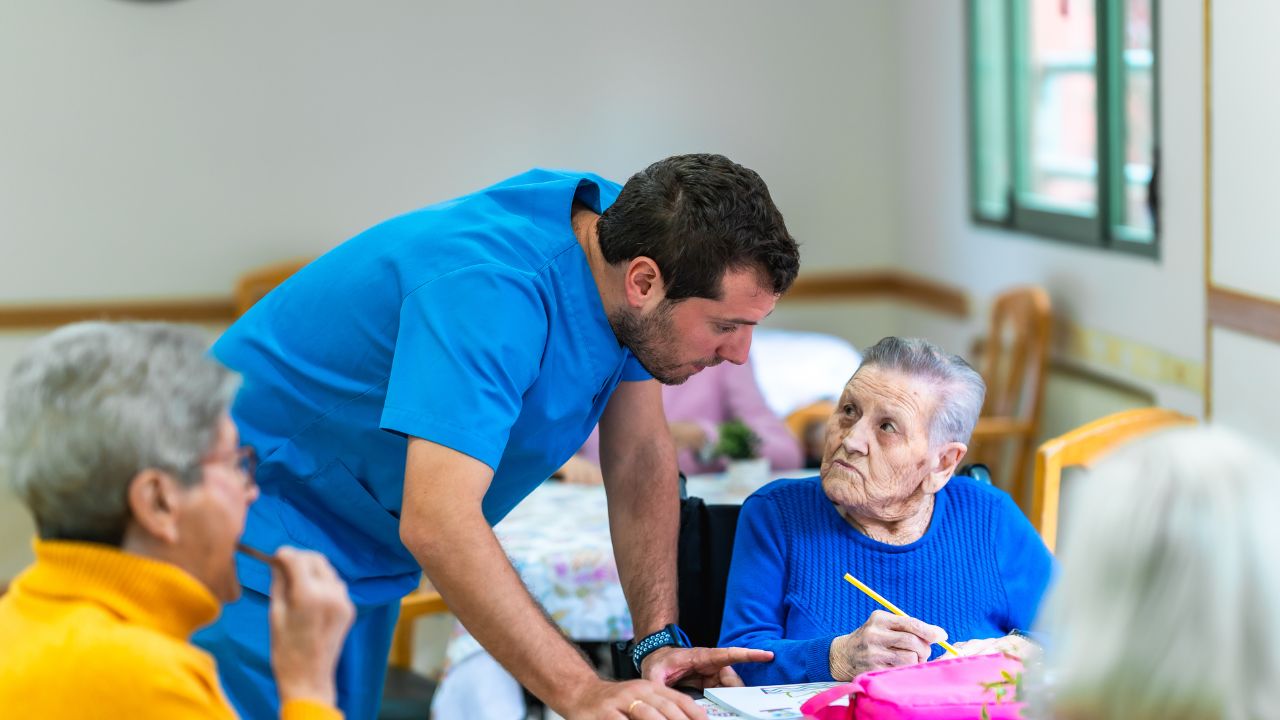So, you’ve decided to become a nurse, the “most trusted profession”—and one of the most stressful ones too.
Regardless of why you chose nursing in the first place or how you ended up here, you may as well make the most of it—both figuratively and literally.
What does this mean?
Be empathetic, patient, and caring, and make the most money.
This is what we are here for today: to steer you in the highest-paying direction in the nursing field as a registered nurse (RN).
Sure, someday you may decide to pursue an advanced practice nursing degree, but for now, let’s take a look at how you can maximize your salary without having to pursue a master’s or doctoral degree.
The key to unlocking the top tiers of pay is specialization.
By gaining expertise and certification in highly complex or technically demanding areas, you can secure a spot in the highest-paying nursing specialties—all as an RN.
To fully grasp your potential income and career trajectory, you must first understand:
What are the various nursing specialties, and what do they involve? What educational paths lead to specialized nursing roles?
This article will guide you through the most popular nursing specialties in healthcare that offer the highest earning potential for registered nurses, helping you compare the different roles before pursuing the required key skills.
To realize the earning potential of these highest-paying nursing jobs and understand what type of nursing pays the most, this article focuses on the most lucrative registered nurse specialties currently commanding top salaries in the market, excluding travel and advanced practice nursing (such as nurse practitioners or nurse anesthetists).
Salary snapshot: Top 10 lucrative RN specialties
This table summarizes the highest-paying registered nurse specialties that do not require an advanced practice registered nurse (APRN) degree. Specialties are ranked by potential maximum earning capacity.
For reference, the mean annual wage for registered nurses in the United States is $98,430, based on the most recent data from the U.S. Bureau of Labor Statistics (BLS).
Top 6 critical-care & clinical RN specialties
The roles that pay the most generally share one characteristic: they involve high-acuity patients who require intense, specialized, and often life-saving care.
Understanding how different nursing specialties impact patient care highlights why specific roles command premium pay. The high-stakes nature of these critical care nursing fields is crucial because patients require highly specialized, often life-saving interventions.
This expertise is always in high demand and warrants premium compensation. These roles, defined by constant critical decision-making and managing the most acute patient populations, represent the absolute peak of clinical nursing specialties, directly resulting in the highest salaries for registered nurses.
1. CVOR nurse - Estimated average salary: $152,404
A subspecialty of surgery nursing, cardiovascular operating room (CVOR) nursing requires highly specialized surgical assistance skills for complex, high-stakes cardiac procedures like bypass surgery.
This specialized nursing subspecialty has an estimated average annual salary of $152,404.
2. Pain management nurse - Estimated average salary: $129,445
Focusing on complex chronic and acute pain protocols, this role leverages specialized assessment skills and often involves advanced procedures, such as nerve blocks or implant management, which drives a high salary.
The estimated average annual salary is approximately $129,445.
3. NICU nurse - Estimated average salary: $127,391
Neonatal intensive care unit (NICU) nurses typically command high salaries because of the extreme complexity of caring for high-risk and premature infants.
The technical nature and critical stakes demand specialized knowledge. NICU nurses often earn certifications, such as the RNC Certification for Neonatal Intensive Care Nursing (RNC-NIC®) from the National Certification Corporation.
The average annual salary is estimated to be around $127,391, though some reports suggest salaries as high as $136,826 or more, depending on location and experience.
4. OR nurse - Estimated average salary: $125,976
Registered nurses in the operating room (OR) possess critical technical expertise and mastery of sterile technique. Their integral role in high-revenue surgical procedures places them in a high-paying bracket, with an estimated average annual salary of $125,976.
5. ICU nurse - Estimated average salary: $115,128
The intensive care unit (ICU) is defined by constant critical decision-making and high-acuity patient care. Typically required certifications, such as the CCRN from the American Association of Critical-Care Nurses, combined with the necessity of shift differentials and overtime for the demanding schedule, significantly increase the ICU nurse's salary, with an estimated average annual salary of $115,128.
6. ER nurse - Estimated average salary: $114,037
Emergency room (ER) nurses provide high-volume, rapid assessment, and trauma care.
While the base average salary is often cited around $114,037, the potential for a high ER nurse salary comes from significant access to lucrative shift differentials (for nights/weekends) and overtime, pushing their total earnings even higher.
7. Flight nurse - Estimated average salary: $109,709
Flight or transport nurses provide high-level critical care in dynamic, rapid-transport environments (air or ground). The inherent danger, demanding skill set required to manage high-acuity patients with specialized equipment, and the necessity of specialized certifications contribute to this above-average compensation.
Highest-paying unique nursing specialties beyond bedside care
Not all high-paying RN jobs involve direct critical patient care. Many top earners leverage their clinical knowledge in administrative, consultative, or technical non-bedside roles that are crucial to the business of healthcare. These specialty nursing roles represent valuable alternative nursing career paths.
8. UM nurse - Estimated average salary: $117,961
Working for hospitals or insurance providers, utilization management (UM) nurses review patient care plans for medical necessity and efficiency. It's a consultative role focused on optimizing resources and reducing costs for the organization, requiring sharp analytical skills, which contributes to the high compensation.
9. Informatics specialist - Estimated average salary: $109,710
Nurse informatics specialists act as crucial bridges between clinical practice and IT systems.
Expertise in data management, electronic medical records (EMRs), and healthcare technology is highly compensated and in high demand due to the increasing reliance on digital systems.
The salary range is wide, with some sources listing averages around $98,409 and specialized roles reaching $134,219 or more.
10. Nurse manager - Estimated average salary: $108,163
Nurse managers and administrators assume leadership responsibilities, including budget management, supervisory duties, and oversight of daily operations. The salary reflects increased administrative and personnel responsibility for a department or unit.
The average salary for these positions is reported to be $108,163, although a master's degree can increase earning potential.
Essential skills and responsibilities for high-earning subspecialties
To move into these high-paying roles, you must be able to clearly demonstrate the skills that are essential for each nursing specialty. Review the specific responsibilities and required essential skills for the top-paying nursing subspecialties:
- NICU/ICU: Mastery of advanced life support, rapid physiological assessment, equipment management (ventilators, IV pumps), and critical decision-making under stress
- OR/CVOR: Flawless maintenance of sterile fields, technical knowledge of surgical instruments, anticipation of the surgeon's needs, and crisis management during complex procedures
- Informatics/UM: Strong analytical skills, deep understanding of EMR systems, data analysis, regulatory compliance knowledge, and excellent communication to bridge clinical and technical teams
Which nursing specialties are currently in high demand?

While all nursing fields have strong job outlooks—the BLS projects 189,100 openings for registered nurses each year, on average, until 2034—high demand is concentrated in specific areas. For instance, roles that involve critical technology, high acuity, or specialized administrative oversight are seeing the highest growth and recruitment difficulty, making them the most in-demand. These areas of nursing often offer premium compensation to attract the necessary talent.
How do salary expectations vary across different nursing specialties?
Beyond the highly lucrative critical-care and non-bedside roles, many registered nurse specialties offer compelling career paths with excellent work-life balance. However, the trade-off for less demanding hours or non-acute settings is often a lower average salary.
The table below highlights several specialties that generally fall below the national average RN wage, detailing the primary factors that contribute to their lower compensation.
Salaries for many non-critical roles, such as wound care nurses, often fall within the mid-range of nursing compensation, typically averaging around $101,711, depending on the setting and certification.
How to choose the right nursing specialty for you
Didn’t see a nursing specialty that interests you? Want to know what different nursing specialties are available?
Exploring your options can be key to a lucrative career. If you are debating how to choose the right nursing specialty for you, it is wise to start with a realistic assessment of the pros and cons of different nursing specialties and how to transition from general nursing to a specialty. This strategic approach can define whether you pursue a critical care certification or aim for a high-value non-bedside role like a cosmetic nurse specialty (salary often boosted by commissions).
Explore guides on dozens of nursing specialties here.
What is the difference between registered nurses and nurse practitioners in specialties?
This guide focuses exclusively on RN-level roles.
Registered nurse specialties generally require an Associate Degree in Nursing (ADN) or a Bachelor of Science in Nursing (BSN) degree, along with specialized experience/certification.
In contrast, nurse practitioners (NPs) typically require a graduate degree and hold prescriptive authority, which often leads to higher pay.
Discover the requirements for becoming a nurse practitioner in a specialty field.
Strategies for financial growth: Maximize RN salary expectations
Maximizing your earnings in these highest-paying nursing specialties involves more than just selecting the right title. To achieve this earning potential, nurses must strategically navigate the complexities of nursing education and specialties.
How does location affect a nurse's salary?
The geographical area you work in is a primary factor in the salary expectations for different nursing specialties.
Salaries in the highest-paying states for RNs, like California, Hawaii, and Oregon, can be tens of thousands of dollars higher than the national average for the exact same specialty, reflecting regional competition and economics. This affects the average nursing salary significantly.
Advanced nursing certifications are key
What educational paths lead to specialized nursing roles?
For any of the high-acuity roles, advanced nursing certifications are non-negotiable for top pay. This is a crucial element of the educational paths that lead to specialized registered nurse salary increases.
Certifications like CCRN (Critical Care) or RNC-NIC (Neonatal Intensive Care) demonstrate expertise and commitment, justifying higher compensation and opening doors to senior roles.
How to transition from general nursing to a specialty
Nearly all high-paying specialties prioritize nurses with deep experience.
Roles often seek candidates with 3-5 years of direct experience in the specialty, as expertise reduces risk and improves patient outcomes. Invest your early career years in gaining solid, diverse experience.
Learn more about the factors impacting RN salary in this complete guide.
How to boost your earning potential—without a new specialty
Pursuing a new specialty takes time, training, and commitment. If you're currently in a staff role but want to increase your earnings now, PRN platforms offer a powerful immediate solution.
What opportunities do PRN jobs offer?

Picking up PRN shifts offers an immediate path to higher hourly rates and greater flexibility. You can access shifts in facilities that need immediate coverage, which often results in significantly higher compensation compared to your base staff rate.
PRN work allows you to explore working in various clinical environments and specialties without making a permanent commitment. This exploration helps you gain clarity on how to choose the right nursing specialty for you and weigh the pros and cons of different nursing specialties before making a permanent move.
You can use PRN shifts to:
- Earn significantly higher hourly rates on demand to supplement your primary income.
- Maintain control over your schedule, choosing when and where you want to work to help manage burnout.
- Gain exposure to different nursing specialties and facility types, helping you decide which specialized nursing career paths you want to pursue long term, and understanding the responsibilities of nursing subspecialties first-hand.
The Nursa advantage
Ready to take control of your income and schedule?
Use the Nursa platform to see real-time, high-paying shifts available in your local area. It’s the fastest way to bridge the gap between your current salary and your future earning potential.
Pursue a lucrative future in nursing
The future of nursing offers incredibly lucrative career paths for dedicated RNs.
By investing in certifications and experience, you secure the benefits of pursuing a nursing specialty. Keep an eye on trends in nursing specialties for the future, as areas like informatics and pain management continue to grow. However, recognize that with high pay come challenges that nurses face in specialized roles, demanding intense commitment and continual learning.
Whether you choose to pursue the cutting-edge technology of informatics, the extreme complexity of NICU, or the critical leadership of management, specializing is the clear path to becoming one of the highest-paid nurses.
Invest in specialty certifications and experience, and don't forget to leverage the flexibility of PRN shifts to boost your financial power today.
Sources:


.jpg)





.jpg)





